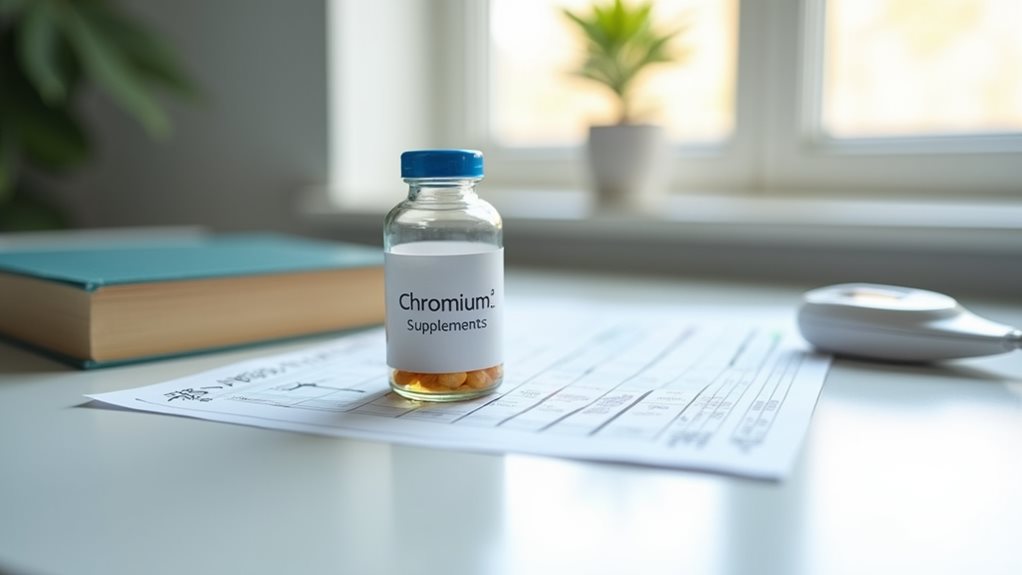
Chromium picolinate, a supplement recognized for enhancing insulin sensitivity, plays a vital role in diabetes management. Its ability to improve insulin action aids markedly in regulating blood glucose levels, which is essential for individuals with insulin resistance or diabetes. Research affirms its efficacy in controlling blood sugar and suggests its potential in mitigating the progression to type 2 diabetes. Continued exploration of chromium picolinate could provide further insights into its benefits as part of an integrated diabetes management strategy.
Key Takeaways
- Chromium picolinate enhances insulin sensitivity, aiding diabetes management by improving glucose uptake.
- Clinical trials indicate chromium supplementation can lower fasting glucose and HbA1c levels.
- Recommended daily chromium intake ranges from 200-1,000 mcg for optimal diabetes control.
- Combining dietary chromium sources with supplementation supports overall metabolic health and diabetes management.
- Regular monitoring and consultation with healthcare providers are essential when integrating chromium into diabetes management strategies.
Understanding the Role of Chromium Picolinate in Reducing Insulin Resistance
Chromium picolinate, recognized for its role in enhancing insulin sensitivity, plays a pivotal part in managing insulin resistance, a common precursor to type 2 diabetes.
This compound facilitates the action of insulin, consequently improving its efficiency in glucose uptake into cells. Research underscores the chromium benefits, particularly in populations with compromised glucose metabolism.
Scientific studies suggest that adequate chromium picolinate supplementation might restore normal insulin sensitivity by influencing intracellular signaling pathways.
This intervention, thus, holds promise for preemptively addressing insulin resistance, potentially staving off the progression to full-blown diabetes in at-risk individuals.
The Impact of Chromium on Blood Sugar Levels and Diabetes Control
Given its potential role in metabolic health, the supplementation of chromium, particularly in the form of chromium picolinate, has been closely studied for its effects on blood sugar levels and overall diabetes management.
Research suggests that chromium benefits individuals by enhancing insulin sensitivity, thereby playing an essential role in blood sugar regulation.
Clinical trials have observed that consistent intake of chromium picolinate can lead to significant improvements in fasting plasma glucose and glycated hemoglobin (HbA1c) levels.
These findings underscore the potential of chromium to aid in the management and control of diabetes, making it a valuable component in therapeutic strategies.
Safety Profile and Important Considerations for Chromium Supplementation

While generally considered safe for most individuals, the supplementation of chromium, particularly chromium picolinate, requires careful consideration regarding its safety profile and potential risks. Safety concerns and dosage guidelines are critical to ensuring beneficial outcomes without adverse effects.
| Aspect | Detail | Consideration |
|---|---|---|
| Safety Concerns | Kidney or liver disease | Not recommended for affected individuals |
| Dosage Guidelines | 200-1,000 mcg daily | Consult healthcare provider |
| Risk Factors | Interactions | Monitor with insulin, anti-diabetics |
| Population | Elderly | Lower chromium levels with age |
| Absorption | Dietary intake | Poor absorption; supplements necessary |
Reviewing Clinical Research: The Efficacy of Chromium in Metabolic Health
The landscape of metabolic health research includes substantial contributions from studies focused on the role of chromium supplementation, particularly chromium picolinate, in managing insulin resistance and enhancing insulin efficacy.
Clinical trials reveal that supplementation from various chromium sources, adhering to specific guidelines, can markedly impact metabolic parameters. Typically, 200-1,000 mcg daily is recommended to improve insulin sensitivity and glucose control.
Research underscores the necessity of precise supplementation protocols to guarantee ideal outcomes. These studies, grounded in evidence-based methodologies, provide a robust framework for understanding how chromium contributes to metabolic health and guides future therapeutic strategies.
How to Integrate Chromium Supplementation Into Your Diabetes Management Plan

Understanding the role of chromium in enhancing metabolic health provides a solid foundation for incorporating chromium supplementation into diabetes management plans. Adhering to chromium dosage guidelines is essential for ideal results. Chromium's benefits are maximized when integrated with dietary sources and supervised medical guidance. Below is a table outlining suggested approaches:
| Strategy | Description | Example |
|---|---|---|
| Dosage Guidelines | Follow recommended daily intake | 200-1000 mcg daily |
| Dietary Integration | Combine with chromium-rich foods | Broccoli, whole grains |
| Medical Supervision | Regular consultations with healthcare | Check-ups every 3 months |
This structured approach guarantees safe and effective diabetes management with chromium supplementation.
Frequently Asked Questions
How Does Chromium Picolinate Interact With Caffeine or Alcohol?
Chromium picolinate's interaction with caffeine remains under-researched, with no definitive evidence indicating a significant impact on chromium metabolism. Concurrent consumption of alcohol may affect chromium absorption but requires further scientific investigation for conclusive results.
Can Chromium Picolinate Help With Weight Loss in Diabetics?
Chromium picolinate may aid weight loss in diabetics by improving blood sugar control and enhancing insulin sensitivity. However, evidence is mixed, with studies showing variable results on its effectiveness in weight management.
Are There Any Age Restrictions for Chromium Supplementation?
Chromium supplementation guidelines suggest caution for elderly individuals due to potential kidney or liver function decline. Age-related considerations are essential; consultation is advised to tailor dosages appropriately and guarantee safety.
Can Chromium Picolinate Be Taken on an Empty Stomach?
Chromium picolinate can be taken on an empty stomach, as considerations regarding absorption factors do not indicate a necessity for food. However, individual tolerance should guide whether to consume with meals for comfort.
What Are the Signs of Chromium Deficiency in Diabetics?
In diabetics, a glaring chromium deficiency might manifest as heightened blood sugar levels, unexpected weight loss, and neuropathy. Significantly, these symptoms underscore the pivotal role chromium functions in glucose metabolism and insulin regulation.
Conclusion
To summarize, chromium picolinate presents a promising prospect for enhancing metabolic management in type 2 diabetes. Scientific studies substantiate its role in stabilizing blood sugar and strengthening insulin sensitivity. However, while the potential benefits beckon, balancing these against a well-understood safety profile is paramount. As part of a thorough diabetes care strategy, integrating chromium requires careful consideration of clinical evidence to guarantee efficacy and safety in its supplementation.





